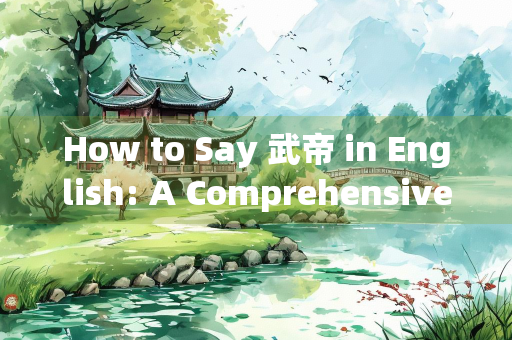Introduction

The term "武帝" (Wǔ Dì) is a significant title in Chinese history, often associated with powerful emperors known for their military prowess and expansive reigns. Translating such cu lt urally rich titles into English can be challenging, as it requires balancing linguistic accuracy with historical context. This article explores the various ways to translate "武帝" into English, examines its historical significance, and discusses notable emperors who bore this title.
Understanding the Meaning of "武帝"
The Chinese title "武帝" consists of two characters:
武 (Wǔ) – Meaning "martial," "military," or "warlike."
帝 (Dì) – Meaning "emperor" or "sovereign."
Thus, "武帝" can be literally translated as "Martial Emperor" or "Military Emperor." However, depending on the historical context, alternative translations such as "Warrior Emperor" or "Martial Sovereign" may also be appropriate.
Historical Context of "武帝"
In Chinese imperial history, posthumous temple names (庙号, miào hào) were used to honor deceased emperors. "武帝" was often given to rulers who expanded their empires through military conquests. Some of the most famous emperors with this title include:
1. Emperor Wu of Han (汉武帝, Hàn Wǔ Dì, 156–87 BCE)
One of the most renowned rulers in Chinese history, Emperor Wu of the Han Dynasty expanded China's territory, strengthened centralized rule, and promoted Confucianism as the state id eology. His military campaigns against the Xiongnu (a nomadic confederation) solidified his reputation as a martial emperor.
2. Emperor Wu of Wei (魏武帝, Wèi Wǔ Dì, 155–220 CE)
Better known asCao Cao, he was a warlord during the late Eastern Han Dynasty and the de facto ruler of the state of Wei. Though he never officially declared himself emperor during his lifetime, his son Cao Pi posthumously honored him as "Emperor Wu of Wei."
3. Emperor Wu of Jin (晋武帝, Jìn Wǔ Dì, 236–290 CE)
Sima Yan, the founder of the Jin Dynasty, reunified China after the Three Kingdoms period and was given the temple name "Wu" for his military achievements.
4. Emperor Wu of Liang (梁武帝, Liáng Wǔ Dì, 464–549 CE)
Xiao Yan, the founding emperor of the Liang Dynasty during the Southern Dynasties period, was a devout Buddhist but also engaged in military campaigns early in his reign.
How to Translate "武帝" into English?
Given the historical weight of the title, there are several possible translations:
1. "Martial Emperor"
This is the most direct and widely accepted translation. It accurately conveys the military emphasis of the title while maintaining the imperial connotation.
Example: "Emperor Wu of Han (汉武帝) is often referred to as the Martial Emperor of Han."
2. "Military Emperor"
This translation is also accurate but slightly less common in historical literature. It emphasizes the ruler's military achievements.
Example: "Cao Cao was posthumously honored as the Military Emperor of Wei."
3. "Warrior Emperor"
This version adds a more dynamic tone, suggesting not just military leadership but also personal combat prowess.
Example: "The Warrior Emperor of Jin reunified China after centuries of division."
4. "Martial Sovereign"
A more formal and poetic alternative, "sovereign" carries a regal tone while retaining the military aspect.
Example: "The Martial Sovereign of Liang was both a conqueror and a patron of Buddhism."
Why Is the Translation Important?
Accurately translating "武帝" is crucial for historians, translators, and students of Chinese history because:
1、Preserving Historical Nuance – The title reflects the emperor's legacy, and an imprecise translation could misrepresent their reign.
2、Academic Consistency – Standardized translations help avoid confusion in scholarly works.
3、Cultural Representation – The term carries deep cultural meaning, and the right translation ensures proper respect for historical figures.
Common Misconceptions in Translation
Some may mistakenly translate "武帝" as simply "Emperor Wu," using the pinyin romanization without conveying the meaning. While this is acceptable in some contexts, it does not explain the significance of the title.
Less Accurate: "Emperor Wu of Han was a powerful ruler."
More Informative: "The Martial Emperor of Han expanded China's borders through military campaigns."
Conclusion
The best English translation for "武帝" depends on context, but "Martial Emperor" is the most widely accepted. Other variations like "Military Emperor," "Warrior Emperor," or "Martial Sovereign" can also be used depending on stylistic preference. Understanding the historical background of emperors who bore this title helps in choosing the most accurate and respectful translation.
Whether discussing Emperor Wu of Han's conquests or Cao Cao's strategic brilliance, the term "武帝" encapsulates the legacy of rulers who shaped China through strength and warfare. By carefully translating this title, we ensure that their stories are told with the depth and reverence they deserve.
This article provides a detailed exploration of how to translate "武帝" into English while maintaining historical and cultural accuracy. Would you like any additional sections, such as comparisons with similar titles in other cultures or further reading recommendations?
本文地址: https://www.shuiwy.com/a/97220.html
文章来源:im
版权声明:除非特别标注,否则均为本站原创文章,转载时请以链接形式注明文章出处。
2026-01-14im
2026-01-14im
2026-01-14im
2026-01-14im
2026-01-14im
2026-01-14im
2026-01-14im
2026-01-14im
2026-01-14im
2026-01-14im
2024-03-03im
2024-01-24im
2023-05-29im
2023-06-04im
2023-06-16im
2023-10-07im
2023-06-20im
2023-10-07im
2023-06-19im
2023-06-14im
扫码二维码
获取最新动态
